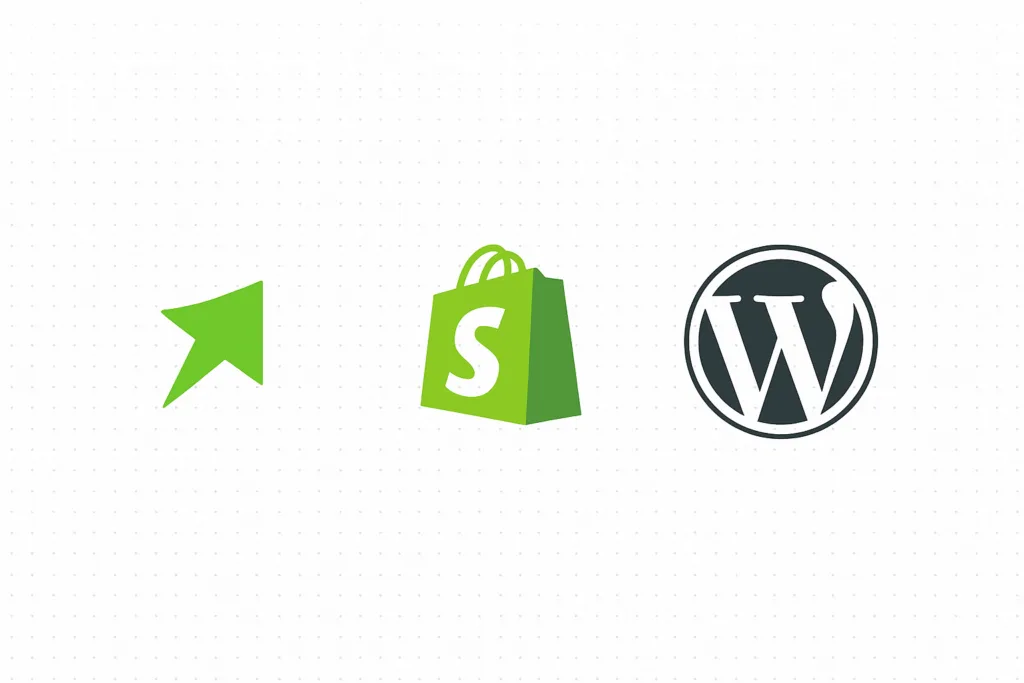Shopify vs. WooCommerce: The Key Differences for Industrial Manufacturers

Updated: November 11, 2025
If you’re an industrial manufacturer looking to modernize your online catalog or move away from outdated systems like ThomasNet Navigator, you’ve likely come across two main options: Shopify and WooCommerce.
At first glance, both seem capable of powering a professional B2B website — but in reality, they serve very different needs. One is built for simplicity, reliability, and scalability (Shopify), while the other gives you full control and customization (WooCommerce).
Choosing the right platform depends on your company’s goals:
Do you want to sell products online and accept RFQs through a modern, fast website that your marketing team can manage without IT?
Or do you want complete technical control and are willing to handle the maintenance, hosting, and updates internally or through an agency?
In this article, we’ll break down the core differences between Shopify and WooCommerce, explain how each impacts SEO, performance, and scalability, and help you decide which is the better long-term fit for your manufacturing business.
Key Benefits of Shopify Over WooCommerce for Industrial Manufacturers
- No hosting or maintenance hassles
- Faster, more reliable site performance
- Easier for marketing teams to manage
- Stronger B2B tools and integrations
- Predictable pricing with enterprise-grade security
- Ideal for hybrid RFQ + e-commerce setups
Why Shopify Is a Smart Move for Industrial Manufacturers
1. Speed and Reliability
Shopify runs on one of the fastest, most secure hosting infrastructures in the world.
- Average site load speed: under 2 seconds on optimized themes.
- Automatic SSL security, daily backups, and 99.99% uptime – no IT headaches.
- Manufacturers switching from ThomasNet often see page load speeds improve by 3–5x, which directly impacts SEO and lead conversions.
2. Fully Mobile-Responsive
ThomasNet Navigator sites often fail Google’s mobile usability test. Shopify themes are built mobile-first, which helps you rank higher on both Google and AI-driven search (since both reward mobile performance and Core Web Vitals).
3. Better SEO Control
Shopify lets you fully manage:
- Meta titles and descriptions for every page and product
- Schema markup (rich data for product specs, pricing, and availability)
- Custom URL structures and redirects
- Integration with SEO tools like Ahrefs, SEMrush, and Google Search Console
- AI tools like Yoast SEO for Shopify or Tapita AI SEO Optimizer for automatic optimization
Translation for manufacturers: you get true Google and Bing visibility, not just a directory listing buried in ThomasNet.
4. Perfect Hybrid for E-Commerce + RFQs
Unlike ThomasNet, Shopify gives you flexibility:
- Sell replacement parts or components online (e-commerce)
- Add RFQ forms for custom projects or bulk orders
- Connect HubSpot, Zoho, or Pipedrive CRM systems to track incoming quote requests. And Shopify’s own data and analytics setup is state of the art.
Example setup in Shopify
- A machining company can list standard parts for sale online.
- Larger custom jobs trigger an “Add to Quote” button that captures lead details.
5. Modern Integrations That Save Time
Shopify integrates directly with:
- ERP systems like NetSuite, SAP, and QuickBooks
- Marketing tools like Google Ads, Meta Ads, and Klaviyo
- Inventory and shipping apps (ShipStation, UPS, etc.). No need for manual uploads or clunky data management.
6. You Own Everything
Unlike ThomasNet, your Shopify site belongs entirely to you – your domain, your SEO equity, your customer data, and your analytics. If you ever leave Shopify, you can export all of your data easily.
Shopify Cost Breakdown for Manufacturers
| Plan | Monthly Cost (if billed yearly) | Transaction Fee (Shopify Payments) | Best For |
| Basic | $29/month | 2.9% + $0.30 per transaction | Small manufacturers just starting e-commerce |
| Shopify | $79/month | 2.6% + $0.30 per transaction | Growing companies with more products or RFQs |
| Advanced | $299/month | 2.4% + $0.30 per transaction | High-volume manufacturers with multiple users and advanced reporting |
Realistic Example for an Industrial Manufacturer
- You use Shopify’s $79/month plan.
- You process $12,000 in monthly e-commerce orders (mostly small orders).
- Shopify’s fees: roughly $520–$600 total per year, plus normal card fees.
- You get unlimited product listings, unlimited bandwidth, and built-in hosting.
Optional Shopify Add-Ons for Manufacturers
| Add-On | Typical Cost | Purpose |
| Request a Quote App (e.g., Globo RFQ) | $10–$15/month | Adds RFQ form functionality |
| Wholesale Pricing App | $15–$25/month | Allows tiered pricing for B2B buyers |
| Chatbot / Live Chat (HubSpot, Tidio) | Free–$20/month | Improves lead capture and response speed |
- Ownership
- Speed
- Mobile performance
- SEO visibility
- Integrations that actually drive leads and sales
Even when factoring in apps, hosting, and payment fees, Shopify remains less expensive and far more powerful than ThomasNet Navigator – with measurable ROI. Also superior to WordPress and WooCommerce if you wish to optimize for e-commerce orders.
| Feature | Shopify | WooCommerce (WordPress) |
| Hosting & Maintenance | Fully hosted by Shopify — no need to manage servers, updates, or security. | Self-hosted — you’re responsible for hosting, plugin updates, and backups. |
| Speed & Performance | Shopify sites are globally optimized with built-in CDN and fast load times out of the box. | Performance depends on hosting provider and configuration; can slow down with heavy product catalogs. |
| Ease of Use | Extremely user-friendly; drag-and-drop editor, minimal setup, and intuitive dashboard. | Steeper learning curve; requires more technical management and plugin setup. |
| Security & Compliance | PCI-DSS compliant by default (important for B2B payments). Automatic SSL and updates. | Must handle your own SSL certificates, plugin vulnerabilities, and security patches. |
| SEO Control | Great built-in SEO with structured data support and optimized themes. | More flexibility and deep SEO control via plugins (Yoast, Rank Math). |
| Scalability | Seamlessly scales from 10 to 10,000 SKUs without breaking. | Needs server optimization for large catalogs or complex databases. |
| Integrations | Deep native integrations with ERPs, CRMs (HubSpot, Salesforce), and marketplaces. | Broader integration library, but may require plugins and more maintenance. |
| RFQ Support | Can easily add RFQ apps (e.g., Globo, Hulk) alongside e-commerce. | RFQs possible via custom forms or plugins, but setup is manual. |
| Cost Predictability | Flat monthly fee with clear pricing and hosting included. | Hosting, plugins, and maintenance costs vary – can add up quickly. |
| Ownership | You don’t own the hosting infrastructure (Shopify hosts everything). | You fully own the website, hosting, and database. |
| Ideal For | Manufacturers who want a turnkey, low-maintenance, scalable site with RFQs + e-commerce. | Manufacturers who want full customization and have internal or agency tech support. |
Real-World Benefits of Shopify for Industrial Manufacturers
1. Faster Time to Market
Manufacturers can go live with a professional, mobile-optimized catalog in weeks, not months. Shopify’s ready-made industrial themes make it ideal for companies transitioning off ThomasNet Navigator or outdated B2B portals.
2. No IT Team Required
Shopify handles hosting, speed, security, and updates. Your marketing team can edit product data, add RFQs, and track leads without ever touching code.
By contrast, WooCommerce requires someone to manage plugin updates, hosting issues, and compatibility checks.
3. B2B Features That Fit Manufacturing
Shopify now offers B2B-specific functionality, including:
- Company profiles with custom pricing and payment terms
- Purchase order workflows
- Customer-specific catalogs
- Net payment options (e.g., Net-30)
This makes it an ideal solution for manufacturers that serve distributors or OEM customers who buy in volume or on account.
4. Stable, Scalable Infrastructure
Shopify handles global brands processing millions in monthly orders. Manufacturers don’t have to worry about server downtime during trade shows, campaigns, or catalog updates.
On WooCommerce, performance can tank if the site isn’t hosted properly – especially with large part catalogs.
5. Better Mobile UX (Core Web Vitals)
Shopify’s themes are optimized for Core Web Vitals, which helps your site rank higher in Google and AI-driven search systems. This matters because over 60% of B2B buyers now use mobile devices during their purchasing journey.
6. Predictable Monthly Cost
Shopify’s plans include hosting, support, SSL, and maintenance – no surprises. WooCommerce looks cheaper initially, but once you factor in:
- Hosting ($20–100/mo)
- Premium themes/plugins ($200–500/yr)
- Maintenance/developer costs ($1000+/yr)
…it often ends up costing more.
7. Stronger Data Insights
Shopify includes real-time analytics, sales funnels, abandoned cart tracking, and built-in reporting.
For WooCommerce, you need extra plugins or Google Analytics setup to get the same insights.
When WooCommerce Still Makes Sense
To be fair, WooCommerce is still an excellent choice when:
- You have an in-house web developer or agency partner.
- You need deep customization or complex data structures.
- You want to own every part of your tech stack (no dependency on Shopify).
- Your focus is lead generation only (not direct online sales). In this case you should just go with WordPress without WooCommerce.
But for most industrial manufacturers who want to modernize fast and minimize maintenance, Shopify delivers a cleaner, faster, and more profitable path forward.
Final Verdict: Why Shopify Wins for Industrial B2B
Shopify is purpose-built for growth-minded manufacturers who want:
- A stable, secure, and fast website
- Easy product and RFQ management
- Predictable pricing
- B2B-ready features with minimal maintenance
If you’re serious about growth and visibility:
- Shopify → Best for companies doing both e-commerce and RFQs.
- WordPress → Best for companies focused purely on RFQs and lead generation.
If your team’s goal is to get more qualified leads and streamline digital sales without the burden of constant upkeep, Shopify is the clear winner. It’s time to stop renting your visibility and start owning your digital future.
Want to move away from ThomasNet Navigator?
Let us show you how Shopify or WooCommerce can perform much better to help you reach your sales goals.
Click on a star to rate this post!





